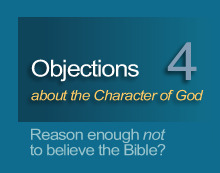WHY THIS?
This is another classic case of a biblical paradox; two seemingly contradictory verses.
The fact that neither verse has been struck from the texts suggests that, if the texts were long ago judged inspired, in-part for their consistency, there must be a good reason.
What is it?
"Does God change his mind like the Bible says? "
"And also the Glory of Israel will not lie or change His mind; for He is not a man that He should change His mind."
1 Samuel 15:29 NASB
"So the Lord changed His mind about the harm which He said He would do to His people."
Exodus 32:14 NASB
RESPONSE:
The book of 1 Samuel says God does not change his mind, whereas the passage in Exodus reads like he does. Looks bad for the Bible - what's the deal?
The assertion by 1 Samuel and other passages, first of all, is that God's character absolutely does not change. If this is characteristic of God like most passages do indeed assert, then character change appears technically impossible. This is worth a brief explanation:
1) If God indeed exists in eternity, then there does not exist a "before" and "after" for him to distinctly move from-to.
2) Character change implies improvement or detriment. But if God is perfect, then he can't change for the better or the worse.
3) If God is omniscient, then no knowledge can be said to suddenly come to light for him to justify a different attitude.
So if all this firmly deduces God to be absolutely unchangeable in character, what's happening in Exodus?
People of Israel had begun worshipping an idol in violation of what God had instructed. What is the penalty for sin? It's death as proscribed by God's characteristic of being just and promising sin will be punished. But after God said they would be destroyed, Moses interceded and pleaded on behalf of his people. So what is the fruit of penitence and humility? It's mercy as proscribed by God's characteristic of showing mercy to the penitent. Thus like swerving a car back onto the road that had been headed for a cliff, Moses changed the direction in which the Israelites had been headed.
One minute the Grand Canyon threatens our life, the next it's blessing us with a spectacular view. But it isn't the canyon that keeps moving from one side of the car to the other; it's our screwy control of the wheel that only gives that impression. So it is with God.
If I'm an unbeliever, God promises to cast me away. Upon my repentance, God promises to save me. It's not that God is one minute just, and the next minute merciful. He is always both. It's only my relationship to him that determines the "change". God's judgment of my action in this case is conditional upon my action. The change is in me.
As far as the wording of the NASB is concerned, the phrase "God changed his mind" is somewhat phenomenological in nature, like the term "sunrise". We know the sun isn't moving around our planet, it just looks that way. Similarly God's mind doesn't change concerning how he judges certain actions we take, but it is sometimes described that way.
Additionally, are we positive the author didn't mean to portray God as actually intending to go through with the destruction of Israel in the above quotation?
Yes, because similar to the Abraham and Isaac situation, God had specific plans for the continuation of the very people that had once been headed for destruction - most prominently the prophesied lineage of Christ. It was not his plan to destroy them. It was his plan that Moses would intercede. And that is established by the fact that the author who foretold of the coming Messiah's lineage is the very same author who penned "the Lord changed his mind".
See also:
Abraham and Isaac
What about those laws that were to be binding for all time?



Expanded!